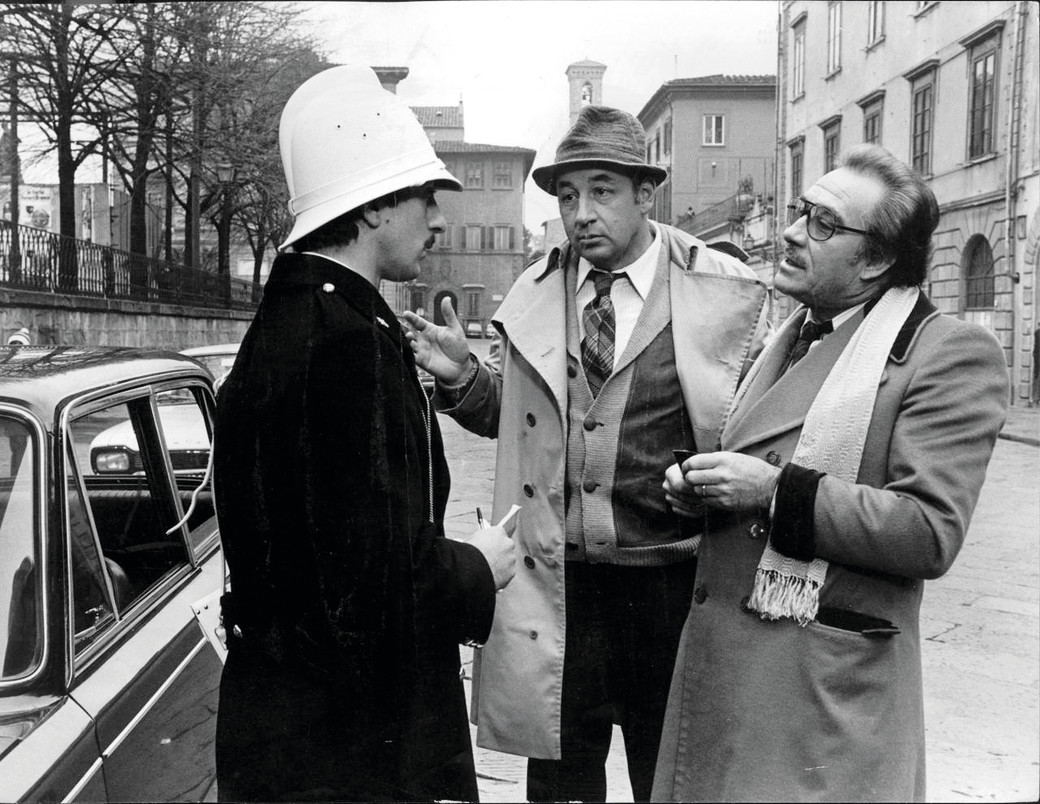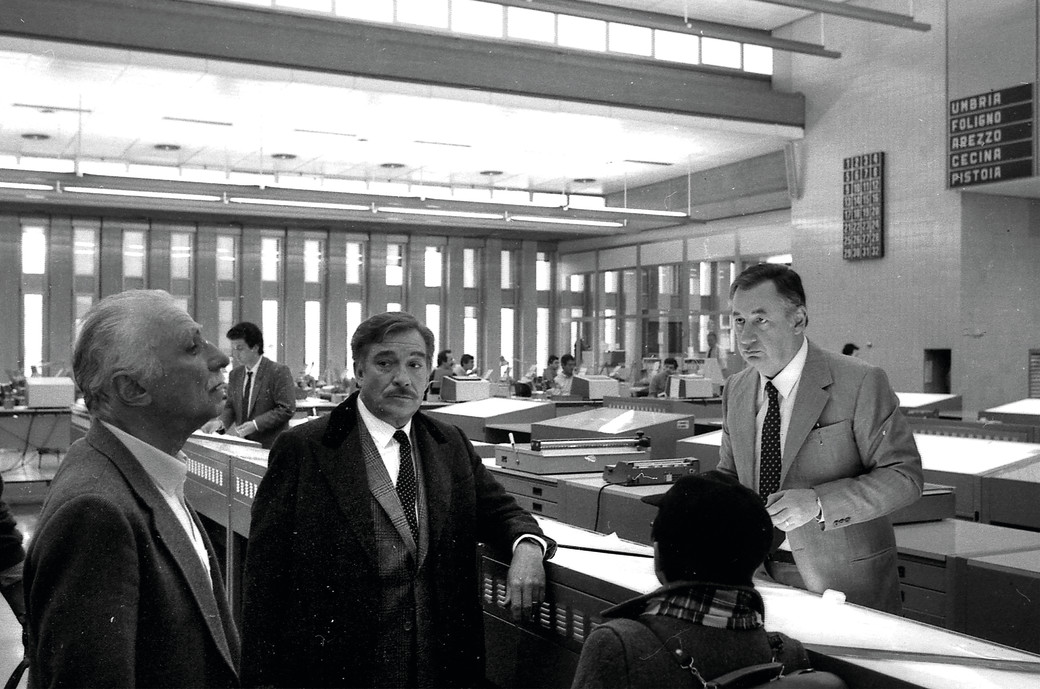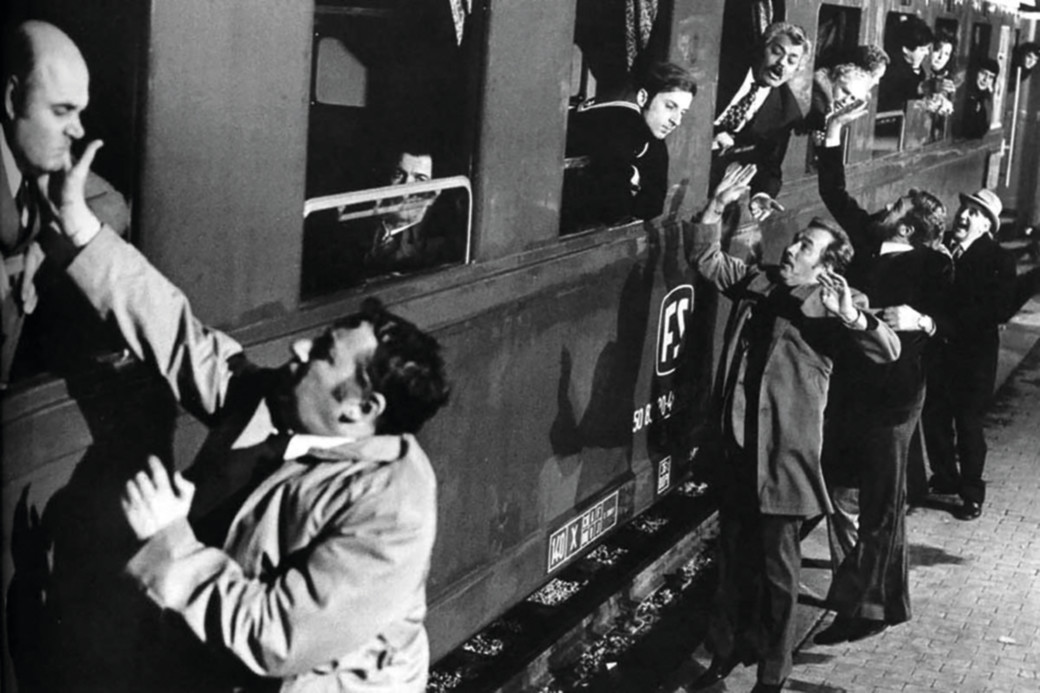Behind the scenes of Amici miei
A zingarata to pay homage to the great Ugo Tognazzi 100 years after his birth
An old head reporter of an Emilia newspaper, Ernesto Ragazzoni, generally seen as having a good sense of humour, wrote the best and bitterest synthesis of the end of a newspaperman’s day’s work a great many years ago. Here it is: ‘The newspaper has been printed / the rotary press is rushing / I’m leaving with my collar turned up / with cigarette smoke trailing me’.
This is the bitter beginning to the film My Friends anticipated by many decades. It is late at night, a cappuccino at the bar where Perozzi, unkempt head reporter, has turned his hand to news vending distributing the newspaper which has just come out to prostitutes relaxing after a long night’s work. At the time that head reporter gave me a lump in my throat. And it’s the same today. What’s left to say? How many newspapers have ended up thus, as an easy joke with friends and colleagues like Riccardo Berti and Piero Gherardeschi: a stop at the Borgognissanti bakery for a just baked croissant; a trip around the airport which one night we found open and deserted with a homeless man sleeping in the airliner on the airstrip whom we managed to wake up only by shouting ‘fire!’. And how many times, finding a fire engine on the deserted roads, did we do a U-turn and follow it into the unknown? Returning home one night, again with Pietro Gherardeschi, we found three murder victims in a stationary car with its headlights on in the middle of the road. We never got to bed.
 amici miei
amici mieiWere these pranks? No, it was a trade which no one, in these changed times, pays due respect to, lets us get nostalgic or understands why we feel that way. It was the best of times. Before being directors or special envoys we’d been reporters.
My Friends was born at La Nazione and I played my part in the film with a walk-on part in the great page layout room in which the newspaper was set out every night. A colleague, cultural editor Sandro Bugialli at a time when such a thing still existed - arrived out of breath and said to the head editor: ‘Cecchi da Prato phoned, there’s been a terrible accident’… That was me. And when I saw the film I was overcome with deep, total sadness, for Perozzi, who sought to escape his life by running away - those pranks - with a group of equally bitter, disappointed and lonely friends. Quattro fleurs du mal, who then became five. With an inimitably Tuscan vicious sense of humour.
 Philippe Noiret, Ugo Tognazzi e Mario Monicelli, in ‘La Nazione’ in Florence.1982. Ph New Press Photo
Philippe Noiret, Ugo Tognazzi e Mario Monicelli, in ‘La Nazione’ in Florence.1982. Ph New Press PhotoMonicelli makes a cult masterpiece out of it, serving up the most cynical, frosty irony according - as always in his work - a powerful role to friendship which is the bond between a band of losers each of whom is looking for himself without ever finding it. Mascetti has lost his assets and a place in the aristocracy, Perozzi the dream of a normal life and a family, Necchi - sex obsessed bar man in Piazza Demodoff - his peace of mind. Sassaroli has been buried alive by the boredom of his job and family, a dog on a leash who hands himself over fully to Melandri, a disappointed architect disenchanted by his work and desperate for love. It is a film on the things we don’t have, the ones we’ve lost, on ‘nostos’ Ulysses’ nostalgia for an Ithaca he can’t find.
Many of the stories told come from La Nazione: the most famous, train travellers beaten up at night, I’d heard from my colleague Bacher - the then legendary night reporter - in the early 1970s. He’d seen it. A group of night wanderers, unruly young people who took to slapping those leaving by train. While we’re on the subject Bacher had Mascetti’s car which backfired every few feet. You heard it coming from a long way away with the night’s stories.
 amici miei
amici mieiMonicelli made a cult film out of it which is a source of regret today for people like me: the Florence of those years was profoundly different. More human in scale. Fewer tourists, fewer cars, nights with absolutely no night life. Even clean. Just try doing a car slalom in Piazza Santa Croce, as Perozzi does, today. Try running around deserted streets. Try organising fake shooting contexts in the once empty space where Mandela Forum stands today.
A cult film to avoid watching when you’re feeling blue but totally not-to-be-missed, a film in which the ‘day’ ends with a last prank: Perozzi’s death is a funeral of non-stop farce with a funeral procession marked out by the bom bom bom of the surviving four to the rhythm of their song accompanied by jokes and cruel quips. And before he dies the late lamented agnostic having the priest called and confessing with their apparently meaningful ‘nonsense’ a stream of disconnected phrases used by the five on the most disparate occasions. To confuse and deride whoever their target was. Frequently town police officers. This nonsense is essentially a metaphor for a loved but lost childhood which they attempt to rediscover: a smutty childish language borrowed from adults whos never wanted to grow up.
More than one critic has written that Perozzi’s funeral is ‘over the top’ with its non-lifelike cynicism and irony. For me it is an absolute Tuscan classic. I was seriously ill in Arezzo hospital when four friends came to visit: an undersecretary of state, a head medical consultant, a mayor and a Misericordia undertaker. At the end of my bed they regarded me ironically while the undertaker measured me up “for your coffin. When you stay in bed you get longer you know”. I sent them packing with the last breath I had left.
This is a Tuscan prank. Machiavelli’s in The Mandrake or Boccaccio’s in the Decameron. Where jokes take cynicism to their cruel, vicious limit with no harm meant. It’s just fun. It is this notebook on the lives of these five which Monicelli got from Pietro Germi and made a gift to Italian cinema of. Five creations inspired by originals which really did exist and are now the models for the My Friends of our own day. One whose spontaneous, painful, bitter and creative search for life these magnificent five scoundrels in search of a moral they never find it never, however, succeeded in equalling. Because no moral exists.









